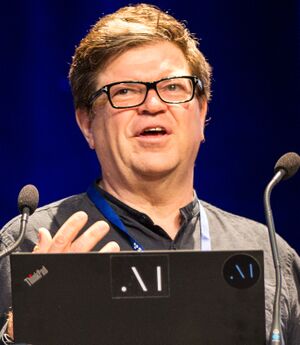Difference between revisions of "Yann LeCun"
(stub) |
(Yoshua Bengio link in lede) |
||
| (One intermediate revision by one other user not shown) | |||
| Line 3: | Line 3: | ||
|twitter= | |twitter= | ||
|constitutes=computer scientist | |constitutes=computer scientist | ||
| − | |image= | + | |image=Yann LeCun - 2018 (cropped).jpg |
| − | |interests= | + | |interests=deep learning |
|nationality=French | |nationality=French | ||
|birth_date=July 8, 1960 | |birth_date=July 8, 1960 | ||
| − | |birth_place= | + | |birth_place=Soisy-sous-Montmorency,France |
|death_date= | |death_date= | ||
|death_place= | |death_place= | ||
| − | |description= | + | |description=French computer scientist working primarily in the fields of [[machine learning]], computer vision, mobile [[robotics]], and computational [[neuroscience]] who attended the [[2022 Bilderberg]] |
|parents= | |parents= | ||
|spouses= | |spouses= | ||
| Line 17: | Line 17: | ||
|alma_mater=ESIEE Paris,Pierre and Marie Curie University | |alma_mater=ESIEE Paris,Pierre and Marie Curie University | ||
|political_parties= | |political_parties= | ||
| − | |employment | + | |employment= |
| − | |||
| − | |||
| − | |||
| − | |||
| − | |||
| − | |||
| − | |||
}} | }} | ||
| − | + | '''Dr Yann André LeCun''' (originally spelled Le Cun) is a French computer scientist working primarily in the fields of [[machine learning]], computer vision, mobile [[robotics]], and computational [[neuroscience]]. He attended the [[Bilderberg/2022|Bilderberg]] in 2022, six years after another pioneer in the field of [[deep learning]], [[Yoshua Bengio]]. | |
| − | '''Yann André LeCun''' (originally spelled Le Cun) is a French computer scientist working primarily in the fields of [[machine learning]], computer vision, mobile [[robotics]], and computational [[neuroscience]]. | + | |
| + | ==Education== | ||
| + | LeCun received his Diploma in Electrical Engineering from the [[École Supérieure d'Ingénieurs en Électrotechnique et Électronique]] (ESIEE) in [[1983]] and his PhD in [[Computer Science]] from the [[University of Paris VI]] (Pierre et Marie Curie) in [[1987]]. In his dissertation he used an early form of backpropagation for [[artificial neural networks]]. As a post-doctoral fellow he was at the [[University of Toronto]] with [[Geoffrey Hinton]]. | ||
| + | |||
| + | ==Career== | ||
| + | From [[1988]] he was at [[Bell Laboratories]] in Holmdel, [[New Jersey]], where he became Head of Image Processing Research in [[1996]]. After a brief stint at the [[NEC research laboratories]] in [[Princeton]], he became a professor at [[New York University]] in [[2003]], where he was the founding director of the [[New York Center for Data Science]]. In [[2013]] he became director of [[AI]] research at [[Facebook]].<ref>https://research.fb.com/people/lecun-yann/</ref> He also works part-time at [[New York University]]. | ||
| + | |||
| + | He worked on text recognition (OCR and handwriting recognition, his system developed at ATT Labs was used by many banks), artificial neural networks, image processing and compression. He created the image compression behind DjVu , which was developed at ATT Labs in the 1990s. Co-developers were [[Léon Bottou]] and [[Patrick Haffner]]. Later he also worked on [[machine learning]], [[artificial intelligence]], [[mobile robotics]], and [[algorithmic neuroscience]]. | ||
| + | |||
| + | He is considered the founder of Convolutional Neural Networks (CNN), which he also developed at Bell Labs.<ref>https://www.theverge.com/2019/3/27/18280665/ai-godfathers-turing-award-2018-yoshua-bengio-geoffrey-hinton-yann-lecun</ref> | ||
| + | |||
{{SMWDocs}} | {{SMWDocs}} | ||
==References== | ==References== | ||
{{reflist}} | {{reflist}} | ||
| − | |||
Latest revision as of 14:26, 29 November 2023
(computer scientist) | |
|---|---|
 | |
| Born | July 8, 1960 Soisy-sous-Montmorency, France |
| Nationality | French |
| Alma mater | ESIEE Paris, Pierre and Marie Curie University |
| Interests | deep learning |
French computer scientist working primarily in the fields of machine learning, computer vision, mobile robotics, and computational neuroscience who attended the 2022 Bilderberg | |
Dr Yann André LeCun (originally spelled Le Cun) is a French computer scientist working primarily in the fields of machine learning, computer vision, mobile robotics, and computational neuroscience. He attended the Bilderberg in 2022, six years after another pioneer in the field of deep learning, Yoshua Bengio.
Education
LeCun received his Diploma in Electrical Engineering from the École Supérieure d'Ingénieurs en Électrotechnique et Électronique (ESIEE) in 1983 and his PhD in Computer Science from the University of Paris VI (Pierre et Marie Curie) in 1987. In his dissertation he used an early form of backpropagation for artificial neural networks. As a post-doctoral fellow he was at the University of Toronto with Geoffrey Hinton.
Career
From 1988 he was at Bell Laboratories in Holmdel, New Jersey, where he became Head of Image Processing Research in 1996. After a brief stint at the NEC research laboratories in Princeton, he became a professor at New York University in 2003, where he was the founding director of the New York Center for Data Science. In 2013 he became director of AI research at Facebook.[1] He also works part-time at New York University.
He worked on text recognition (OCR and handwriting recognition, his system developed at ATT Labs was used by many banks), artificial neural networks, image processing and compression. He created the image compression behind DjVu , which was developed at ATT Labs in the 1990s. Co-developers were Léon Bottou and Patrick Haffner. Later he also worked on machine learning, artificial intelligence, mobile robotics, and algorithmic neuroscience.
He is considered the founder of Convolutional Neural Networks (CNN), which he also developed at Bell Labs.[2]
Event Participated in
| Event | Start | End | Location(s) | Description |
|---|---|---|---|---|
| Bilderberg/2022 | 2 June 2022 | 5 June 2022 | Washington DC Mandarin Oriental Hotel US | The 68th Bilderberg Meeting, held in Washington DC, after an unprecedented two year hiatus during which a lot of the Bilderberg regulars were busy managing COVID-19 |